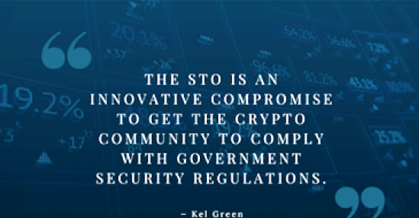Digital Token Offerings & Securities Regulation: Are you an ICO or STO? (the following is courtesy of Prospectus.com LLC)
A question that is harder to ask than whether asked if your product is butter or margarine. Blockchain token sales (aka initial coin offerings or “ICOs”) reportedly topped $5 billion in 2017, with approximately $1 billion ICO offerings originating in the United States, according to a December 2017 report by Ernst & Young. Blockchain technology has a variety of prospective applications, and blockchain tokens can have a variety of features and functionality. For example, some blockchain tokens may function as a virtual currency, or as a license or right to receive a good or service or to use certain software. Even traditional assets like real estate or stock in a company may be “tokenized.” That said, a token’s characteristics and the manner in which the token is sold drives the determination as to whether US securities laws –as well as a growing universe of securities regulations in other jurisdictions-may be applicable, explaining the more recent industry labeling:“securities token offering” , also known as STO.

While much has been said and much has been written on the topic of securities regulations within the context of digital token offerings, it would seem that many are still clueless (or perhaps have bananas in their ears and blinders on their heads). Evan Fisher, a finance industry veteran and business plan consultant at Prospectus.com LLC stated, “Of the several dozens of initial conference calls between the staff at Prospectus.com LLC and crypto cool kids seeking white paper writing and/or investor offering document preparation for respective ICOs, the take away is that many crypto entrepreneurs still suffer from blind eye syndrome and are advancing capital raises in direct violation of established law. ” Adds Peter Berkman, a US securities and real estate attorney who also advises clients of Prospectus.com LLC, “Regrettably, ignorance of the law is not a viable defense strategy for those charged with violating securities laws and/or anti-money laundering laws.” Added Berkman, “the popular argument held by many start-up entrepreneurs in ‘crypto land’ is that their token is not actually a security-which is fine-as long as they’ve set aside several hundred thousand dollars to defend that argument when they wind up wearing court order to appear.”
That said, there should be two rules of thought for those who aspire to advance digital token offerings and who believe they have a great, industry disrupting idea that leverages their fintech fluency and the blockchain ecosystem. First, consider the 3 Duck Rule-If it looks like a duck, walks like a duck and quacks like a duck, regulators will call it a duck and second, advancing the notion that your ‘token’ is a utility device and the pitch to investors is “the value of the token will increase as usage of the token increases”–hence the reason for investing in it-is a thesis that has been advanced by each of the 800+ digital token offerings that have died on the vine before reaching puberty. Leading many investors to ask in retrospect, “What the f*&k happened to the money I invested?!” In turn, leading this author to answer: “Your money has been carefully distributed to a variety of real world assets, including luxury homes, vacation homes, cars, NetJet contracts and other toys purchased by the folks who you sent your money to.” If you’re a crypto cool kid and your value proposition is “If we build it, they will come and they will play” and hence, “its the balls and bats that we provide that will have value and the more folks play, the greater the value of the bat and balls,” we congratulate you for socialistic leanings.
If you’ve got a hot insider tip, a bright idea, or if you’d like to get visibility for your brand through MarketsMuse via subliminal content marketing, advertorial, blatant shout-out, spotlight article, news release etc., please reach out to our Senior Editor via cmo@marketsmuse.com.
On the other hand, sophisticated investors are rapidly losing interest in pitches for digital token offerings that are based on the same premise advanced by dot-com busters–the one that suggested “if we get enough users, we’ll be profitable!” Yes, that proved true for whose business models were based on advertising sales and were able to attract enough eyeballs to appeal to advertisers. And yes, this model has worked beautifully for Alphabet Inc, FaceBook, YouTube and a select universe of others. Yes, you can also go to the dot-com graveyard and locate the thousands of others who never got enough users, or never got advertisers to pay those sites to install a click-able link. In the Software as a Service (SaaS) model, people pay for using a software application on a subscription basis. In the utility token construct, payment to use the software application and those who receive payments is often complex; but investors in the token are generally not sharing in that revenue. They can only look to a return on their investment if a whole bunch of people are using it and if a whole bunch of people are using it, they will need to procure more tokens for continued usage. If there are a limited number of tokens available for using the application, the value of the token will therefore increase. Not to suggest the ‘pay-to-play’ model is bad (its arguably a good business model), the rubber meets the road at the point where users don’t want or don’t need to play with your token–because nobody else cares to play with it.
To read the entire article from Prospectus.com LLC, please click here



